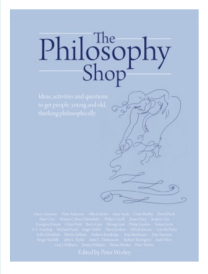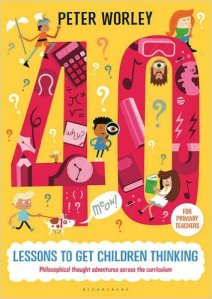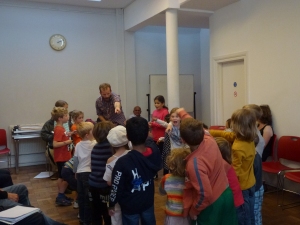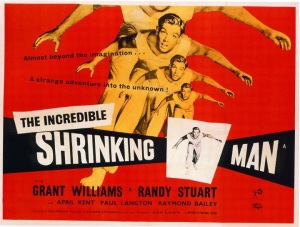Philosophy has been in the news a good deal this week due to some very positive research by EEF into SAPERE’s model that notes improvements to reading and maths. Tom Bennett wrote a piece responding to the P4C buzz yesterday: Philosophy. For children? When thinking requires thinking about something. This is my response to that piece, piece by piece.
Philosophy’s value?
‘The value of Philosophy doesn’t lie in its contribution to literacy, or indeed indirectly to any other perceived good.’ (Tom Bennett)
Should ‘philosophy with children’ be measured according to its instrumental benefits? Does philosophy have its own value? If something is good for its own sake, there’s not a great deal more to say about it than that: music’s good, because it’s good. About philosophy, I might say that it’s good because it comes from what it is to be human: to respond, to reflect, to reason, to re-evaluate, and – arguably – these are among the best things about what it is to be human. But all I can hope for here is that you agree with me; that you share my values.
Or, I might show you research that demonstrates how doing philosophy is good for other things (see link above for an example of this kind of research).
It’s a good thing, as Tom says, that ‘philosophy for children’ (or P4C) can be shown to improve literacy and numeracy, but I’m interested in what it is philosophy offers in and of itself. I am also interested in whether children can get better at it. ‘But why’, objectors may say, ‘should we be interested in what philosophy offers unless it’s the instrumental stuff – that which improves reading, writing and arithmetic, SATs results etc.?’ Because, if there is a correlation between doing philosophy and improved literacy and maths results then surely we want to know why – we want to know the cause.
What I’d like to suggest is that philosophy offers ‘intellectual virtues’ and that these are good in and of themselves, as well as being transferable. They may well be the qualities that confer the improvements identified in research. For instance, if philosophy engenders structured, sequential thinking then this may well be what improves performance in maths. So, what do I mean by ‘intellectual virtues’? Let me make some suggestions (though, in no way final or exhaustive). Those doing regular philosophy may learn and practise…
- How to respond to others in an intellectually appropriate way (whether to be critical, logical, sequential, structural, semantic and so on).
- How to respond to others in a socially appropriate way (with sensitivity, with respect, with confidence, tentatively and so on) that is also intellectually sensitive.
- How to discern and select what is the appropriate response, either to a question, problem, or peer.
- They will gain some insight about how their peers think and learn to approach problems from thinking with their peers.
- They will practise how to appropriately oppose each other while working collaboratively to address controversies and problems.
- …How to structure their thinking well.
- …How to give expression to their thinking so that others may understand them and therefore respond appropriately.
- …How to make appropriate use of empirical knowledge in their argumentation.
- …How to abstract when necessary.
- …How to engage critically with their own ideas as well as those of others.
- …How to judge when to re-evaluate (revise or reject) and when to defend their own ideas. (A good philosopher only defends the defensible.)
- …How to offer reasoned support to a peer when the peer is unable to see good reasons that they may be able to see.
- …How to recognise controversies and problems for themselves.
- …How to judge for themselves when to be open-minded and when to make a judgement on an issue or question.
- …How to evaluate, discern – and in some cases eliminate – ideas and opinions shared in a discussion.
- …They will practise resilience in the face of other’s opposition to their own ideas and resilience to demonstrations made by others of shortcomings within their positions and arguments.
- …They will practise a willingness to re-evaluate.
- …They will practise reflecting on the quality of their own reasoning and how to improve it.
It is because of these (and other) virtues, as practised by the Ancient Greeks (notably Socrates, Plato and Aristotle) that ‘the scientific method’ came about (also logical, structured and sequential), to take just one important example. This is exactly the sort of stuff that can be bottled and integrated into the curriculum as a whole.
The Philosophy Foundation is about to begin a project with King’s College London into this aspect of philosophy. The aim will be to establish what kinds of virtues might be described as ‘philosophical virtues’ and to establish whether philosophical progress can be made, and in what ways we might begin to try to measure such progress. No doubt, this will include the drawing up of some criteria of what philosophy is. If nothing else, it should be interesting.
It’s (not?) what you know
‘This is why philosophy is a particularly hard thing to do with a group of very young children, or those with little knowledge about philosophy. Can you imagine a discussion about Shakespeare if nobody had ever heard of the man? Or a debate about Danish modal verbs populated only by Yoruba speakers?’ (Tom Bennett)
The examples of Shakespeare and ‘Danish modal verbs’ are disanalogous. If we think of philosophy as ‘the history of ideas’ then the analogy might work (though, presumably, one could have a discussion about one of Shakespeare’s plays without knowing who he is or even that he wrote it), but the focus of philosophy in schools is on the process of philosophising, not the history of ideas. Consider the following questions:
‘If something is moving then is it doing something?’
‘If fair is ‘getting the same amount’ then is it fair for Ted to get more cake than the others on his birthday?’
‘Can you make a deliberate mistake?’
‘Is the mind the same as the brain?’
‘If something changes can it be the same thing?’
‘If you take something that you don’t know belongs to someone else then is it stealing?’
To engage in discussions around questions of this sort the children do not really need to know much at all; all they need is some notion of the concepts involved and a notion of the relationship between them. Very often the discussion will be fuelled by the fact that the children have different notions. For instance, some children will think that fair simply means ‘getting the same amount’ and others will think that it has ‘something to do with desert’ while others, that ‘it depends on the situation’. In other words, philosophy discussions in the classroom will – or should – be conceptual, or at least include it. And in many cases, it won’t be a discussion about ‘what something means’ but rather ‘what something is thought to mean’ and the conflicts that arise from the different notions present within the discussion. (We recommend our facilitators ask ‘What do you mean by X?’ rather than ‘What does X mean?’)
This also means that progress can be made (an oft-overlooked aspect of doing philosophy with children) because, for example, a class may begin a discussion thinking that fair is ‘getting what I want’ and later on understand, through arguments put forward by members of the class, that this leads to problems, such as that there are many situations where it is impossible for everyone to get what they want if, for instance, what they want is not available to all. This is conceptual progress; the class (or some within it) now has a more sophisticated, nuanced conceptual understanding of fairness.
You would only need to know something about philosophy (as ‘history of ideas’) if the questions were:
‘What is Thomas Hobbes’s response to the problem of The Ship of Theseus?’
‘Does Descartes’s think that the mind is the same as the brain?’ etc.
But these are not the kinds of philosophy questions that are asked of primary-aged children doing philosophy.
When we run our Stage 1 training course – where we train graduates to facilitate philosophy in the classroom – the first thing we do is run an enquiry for the trainees. We usually run an enquiry around the perennial philosophical favourite, ‘The Ship of Theseus’ thought-experiment (the idea is: if something’s parts are replaced gradually over time then can it be considered the same thing?). What is interesting about this is that when we take them through a discussion around the same stimulus had by able 10-year-olds, the graduates are often astonished at how similar the conceptual moves are, differing only in sophistication. The reason this happens is because the facilitation is such that, in both cases, it focuses on the conceptual dimensions of the issue.
Conceptual treatment of non-philosophical topics
You may think that a question such as ‘Is the mind the same as the brain?’ must be an empirical discussion – it must be a science question. But even empirical discussions have conceptual dimensions. For example,
FAC: ‘Is the mind the same as the brain?’
Child A: ‘Yes.’
FAC: ‘Can you say why?’
Child A: ‘Because the mind is inside the brain?’
FAC: Is there anybody who has anything to say about the last speaker’s idea?
Child B: ‘But if a coin is inside a piggybank that doesn’t mean that the coin is the same as the piggy bank.’
FAC: [Turning to child A] Would you like to reply to that?
Child A: ‘Yes. But it’s more like plasticine.’
FAC: Can you say a bit more about that?
Child A: If one bit of plasticine is in the middle of a bigger bit of plasticine then it’s the same. The mind is like that: the mind is in the middle of the brain.
The issue here is conceptual: it is to do with whether if something X is inside something else Y, then can X and Y have a relationship of identity? You don’t need to have any neuroscience to engage in this conceptual aspect of the discussion. To facilitate this successfully, however, one needs to understand what a conceptual discussion is and how it differs from an empirical discussion, or how an empirical discussion can be treated in a conceptual way (for example, with a hypothesis such as ‘Is there an object in the box’ a conceptual discussion might be: ‘What do we mean by object?’ or ‘What do we mean by in?’). This is where, I would argue, expertise is needed. Either someone with this understanding is necessary for a genuine philosophical enquiry, or teachers need to be formally trained so that they are equipped with this understanding and the tools to facilitate it.
‘What [philosophy] might be doing with children might be good practise for debating, or general discussion, and I certainly wouldn’t strike it off the curriculum.’ (Tom Bennett)
Where does philosophy go in the curriculum?
I’ve never really liked the expression ‘P4C’. When I do philosophy with children, teenagers, adults or dogs, I facilitate philosophy. Just philosophy. And they respond as children, teenagers, adults or dogs respond. The dialogical method I use with each of them is basically the same. However, when I train teachers I don’t teach them to do philosophy because I believe – as did the originator or the P4C movement, Matthew Lipman – that it requires specialist knowledge and training in philosophy. I train teachers in something more like what Darren Chetty has coined ‘D4C’. Or, what I might call just dialogue. This does not exclude discussions of a philosophical nature, but neither does it demand them. So, at TPF, we train philosophy graduates to do philosophy in schools; we train teachers to do dialogue with their classes. The difference between philosophy and dialogue is the content. Sometimes discussions using dialogue is philosophical, but it doesn’t have to be; it could be a discussion about how many decimals there are between 1 and 2, what symmetry is, or what growth is or friction. These discussions may become philosophical. For instance, while discussing what goes between 1 and 2, a discussion about the nature of numbers may occur. But it may not. As a ‘visiting philosophy specialist’, when I do philosophy with a class, my job is to make sure that the discussions are genuinely philosophical; that, as far as the class is able, they pursue philosophical lines of enquiry further than they would have if I was not there, and that they continue to pursue intellectual lines of enquiry when I’m no longer there, yet deeper than they would have had they never met me.
There is a place for philosophy, then, as a stand-alone subject, somewhere classes can practice conceptual thinking outside of specialized subjects and therefore free of the need for subject knowledge, but where the same structures of thinking are practised for application in the curriculum subjects. There is also a place for a dialogical treatment (both philosophical and non-philosophical) within curriculum subjects. So, the debate about whether philosophy should be ‘integrated’ or ‘added on’ is a debate premised on a false dichotomy. It’s both.
Peter Worley is the CEO of The Philosophy Foundation charity, president of SOPHIA and a Visiting Research Associate at King’s College London. He is the author of numerous books on philosophy with children including The If Machine, and his latest book is 40 lessons to get children thinking: philosophical thought adventures across the curriculum (published by Bloomsbury and available from September 2015)
 “As the weeks have progressed I have noticed real improvements in regards to how the children respond to one another when they disagree and the quieter children are really beginning to ‘find their voices’. One particular child who finds writing a real struggle due to language barriers was so inspired following a poetry session that he sat and wrote a mainly phonetically correct poem of his own!”
“As the weeks have progressed I have noticed real improvements in regards to how the children respond to one another when they disagree and the quieter children are really beginning to ‘find their voices’. One particular child who finds writing a real struggle due to language barriers was so inspired following a poetry session that he sat and wrote a mainly phonetically correct poem of his own!” For this World Poetry Day, download and use this free resource taken from one of our multi-award winning books The Philosophy Shop, to get your children writing some philosophical poetry of their own.
For this World Poetry Day, download and use this free resource taken from one of our multi-award winning books The Philosophy Shop, to get your children writing some philosophical poetry of their own.














